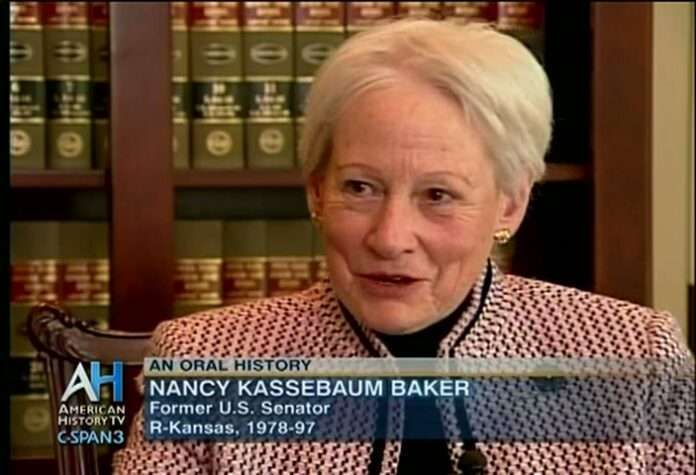Before Joan Finney, there was Elwill Shanahan. Mrs. Finney is seen at the front of a parade that by the 1990s had gathered new energy for women in Kansas politics. Rebuffed by Republicans, Mrs. Finney switched parties in 1974 and ran for state treasurer, won, and was reelected three times. Then she was elected governor in 1990. Women in greater numbers were running for office and winning.
All the while, Elwill Shanahan looked on with approval. Mrs. Finney may have turned a lot of heads in 1974, but Mrs. Shanahan, a Republican, had been Kansas Secretary of State for eight years; in 1966 she was the first woman to hold a constitutionally elected branch of Kansas government.
No list of prominent women in Kansas government can begin without Secretary of State Elwill Shanahan. The agency’s central office then was on the second floor of the Capitol, an open expanse of desks without partition, a hive of energy. In a far corner, a closet space Mrs. Shanahan used for an office, barely big enough for a desk and two chairs. Anyone who spent more than a moment with her learned quickly that she was at once demure and saucy, a consummate politician and shrewd business manager. She spent little time in that private office – the phone rang ceaselessly, yet anyone who called was treated as a long-lost friend. She preferred to be out, seeing people and talking shop with the county clerks, office staff and others in court houses across Kansas.
Mrs Shanahan believed that connections with local officials were crucial to efficient keeping of records, coordinating elections, and otherwise maintaining a smooth conduit between state and local government. She knew people in every city and county office, the names of their children and often their pets. She was frugal, insisting, for example, that pencils be used to the nub, that sufficient scratch paper was found in the discarded envelopes and back sides of letters otherwise headed for a wastebasket.
Her attention to detail, respect for the value of a budget, her admiration for people and for serving them locally gave her high popularity. Mrs. Shanahan was appointed to fill the unexpired term of her husband, Paul, who died in office in 1966, and then was elected and reelected for 12 years, retiring in 1979. Mrs. Shanahan was admired by the assistant secretaries of state who worked for her, learned from her, and applied her core values when they were elected to succeed her, among them Jack Brier (1979-87), Bill Graves (1987-95) and Ron Thornburg (1995-2010). Mrs. Shanahan died of cancer in 1993 at age 71.
*
We were in for an odd moment in 1996, when Sen. Nancy Kassebaum announced that she would not seek reelection to a fourth 6-year term. Late that year we learned why, when she married the magnificent Howard Baker, Republican, former Senator, former White House Chief of Staff (Ronald Reagan), a stiletto master in the Watergate hearings (“What did the President know, and when did he know it?”), former Senate Majority Leader (81-85), Ambassador to Japan (’01-’05), ever the giant in Washington, forever the boy from Tennessee. Mr. Baker suffered a stroke in 2014 and died at age 88.
Nancy Kassebaum-Baker, 88, lives in Burdick, in Morris County, and remains the most popular public servant elected in Kansas. She was first elected to the Senate in 1978 and at the time there was talk that she had won because of the celebrity and authority of her maiden name, Landon. Kassebaum had survived a brutal primary election race with eight other Republicans, got 30 percent of the votes, and faced the popular Democrat, Rep. Bill Roy, in the general election. In mid-October, less than a month before election day and worn from a grueling campaign, she had despaired she would lose. Polls predicted as much. They were wrong.
She was reelected twice by stunning pluralities; in 1984 Kassebaum received more than 750,000 votes, the largest total of any candidate in state history.
Over the years her incredible popularity stemmed from a basic, inviolable belief that she could be trusted. No agenda, no issue, no crowd, no person was too small or too large for her study. By her evenness, her decency, her reasoned beliefs, she inspired faith among constituents and colleagues – unique then and unheard of now, in today’s crude and ruthless political arena.
We were unsettled at the thought that Nancy Kassebaum would leave Washington, leave us for another life, but it didn’t take us long to understand. Washington was no longer much a place for her, or anyone like her. It still isn’t.
(Next: Oh, Susanna!)





